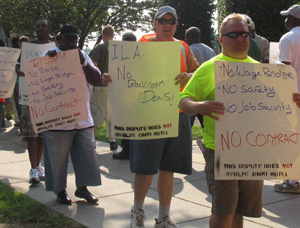Late summer was anything but lazy for a rank-and-file reform group in the East Coast Longshoremen’s (ILA) union. The Longshore Workers Coalition (LWC) exposed secret contract negotiations, channeled member outrage against the concessionary deal, and brought a rift among top leaders into the open.
For months, rumors of secret dealings by ILA President Richard Hughes had dogged negotiations for the master contract covering 12,000 dockers at East and Gulf Coast ports—which doesn’t expire until September 2010.
Despite pledges to respect the demands of 200 rank-and-file members on the union’s official bargaining committee, Hughes brought a “final offer” to the executive board in early September that gave up a scheduled October raise and ignored many of the elected committee’s demands. Wage concessions would have cost workers $40 million in wages, the coalition reports.
PICKET THE E-BOARD
Fifty-five LWC members, some of whom joined 4 a.m. caravans to Washington, D.C., protested outside the executive board meeting in the capital. They tried to enter the meeting—while some board members inside were questioning the terms of the deal—and Hughes shut the meeting down.
After the meeting emptied out, the International secretary-treasurer and a public relations staffer came out and told the picket they didn’t know anything about the contract proposal.
“Hughes tried to usurp the process and present something in a rush,” said Leonard Riley, of Local 1422 in Charleston, South Carolina, a LWC co-chair. “He and others in those talks hadn’t thought out the repercussions. It’s scary that the most influential leaders in the union were asleep at the wheel.”
The deal isn’t dead yet: as Labor Notes went to press, rumors persisted of a second emergency meeting to ram through an agreement before the October 1 pay hike takes effect.
UPDATE, September 28: ILA President Hughes apparently allowed dock employers to forgo October 1 raises, without the approval of other ILA officers or elected bargainers. The Longshore Workers Coalition promised to fight this "outrageous violation," and is traveling to Florida, where Hughes called a bargaining committee meeting. See more at lwcjustice.com.
“Each time the members stand up, management’s offer improves,” said Tony Perlstein, LWC co-chair and secretary-treasurer of New York-area Local 1588. “The ILA leadership wants members to vote in a desperate attempt to save face. As the saying goes: First time tragedy, second time farce.”
MEMBERS’ ISSUES IGNORED
The LWC, a reform force inside the ILA since 1999, had mobilized at the union’s 2007 convention to insist the master contract build a “wage bridge” to connect widely divided salary tiers among members.
Mark Bass, president of Local 22 in Mobile, Alabama, reports that introducing the second-tier wage dropped some members in his local from around $30 an hour to $16.
The aborted deal, a contract extension until 2012, also didn’t include any provision to handle health and safety issues or the impact of new technology on the docks, even as a highly automated port in Virginia has decimated work there.
“What’s the point of having a decent wage if you don’t have a job?” Perlstein asked. “The past generation of longshoremen figured out how to deal with technology—a guaranteed annual income, container royalty payments that spread the gains from productivity increases, and organizing future work created by technology. We have to do the same.”
Riley said there should be a freeze on installing new technology until its impact is fully analyzed and plans can be made to mitigate its effect on the workforce.
The ILA is in serious financial straits, however, leaving some top leaders more concerned about shoring up the union treasury (and their own salaries and pensions) than responding to members’ needs and adapting to a changing industry. The proposed contract extension would have handed the union an infusion of cash by lifting the cap on a fee paid to members for every ton they move.
These royalty payments are taxed at 10 percent by the International and make up most of its income.
“By constantly hammering on members’ issues, we’ve forced the top leadership to respond,” Perlstein said. “Now it’s clear there are two factions, one that wants to take on the issues and one that doesn’t.”
‘OUR CNN’
Within hours of learning about the deal, the LWC had flyers at the ports with details, and used text-messages to quickly update members as organizing against the deal progressed—leading one Baltimore rank and filer to call the LWC “our CNN.”
Information spread quickly because the LWC and New York’s Local 1588 had organized caravans down the East and Gulf coasts in the spring, building a nucleus of supporters in each port.
Participants leafleted hiring halls and met with local officers and members to discuss working conditions, contract enforcement, and the negotiations underway.
Shipping to the East and Gulf Coasts is expected to boom after the Panama Canal expansion is completed in 2014. The coalition says bargaining should stop until the fullest picture is developed of the shippers’ financial outlook—and the economy has picked up again.
Dockers are closely watching the bargaining, Bass said, and tuning into the LWC, since the coalition was speaking up when top leaders would have preferred silence.





